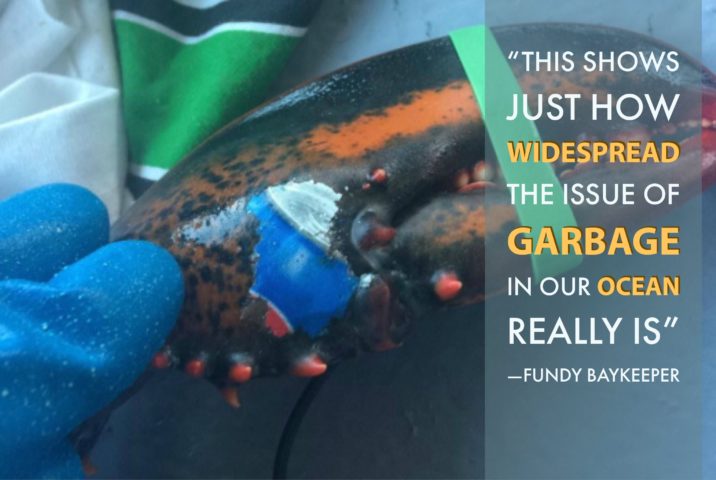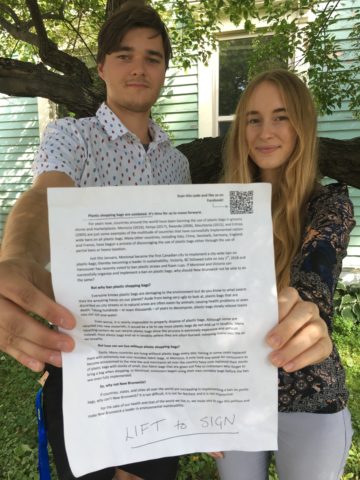[vc_row][vc_column][vc_cta h2=”Election 2018: Ask candidates at your door…” h2_font_container=”font_size:30″ h2_google_fonts=”font_family:Alegreya%20Sans%3A100%2C100italic%2C300%2C300italic%2Cregular%2Citalic%2C500%2C500italic%2C700%2C700italic%2C800%2C800italic%2C900%2C900italic|font_style:400%20regular%3A400%3Anormal” color=”white” use_custom_fonts_h2=”true” use_custom_fonts_h4=”true” css=”.vc_custom_1536243138968{background-color: #abd68d !important;}”]Will you protect our ocean, parks, rivers and lakes by committing to banning single-use plastic bags in New Brunswick?[/vc_cta][vc_column_text]
“Remembering to bring a bag to the store is as simple as remembering to bring your car keys to your car,” says petition founder, Lavallee Forbes.
During a four-month exchange in Morocco, Africa, 21-year-old Lavallee Forbes was amazed by the vibrant markets flowing through the city streets.
The colourful shops offered a treasure trove of local goods and wares — but one type of item was conspicuously absent: plastic bags.
The North African country banned the production, import, sale and distribution of plastic bags in 2016.
Witnessing the success of the forward-thinking move first hand left Forbes, a Fredericton native studying at Queen’s University in Ontario, inspired.
“Spending four months living in a country that had successfully banned plastic bags showed me just how easy plastic bag bans are to implement, and left me wondering why I couldn’t do the same back home,” she told the Conservation Council in a recent interview.
So, she is doing something about it.
Forbes and her friends Rachèle Phinney, Rhys Briden, Tristan Workman, and Lucas Gutiérrez-Robert have launched a petition to ban plastic bags in New Brunswick. They’ve formed a group (Ban Plastic Bags NB – find them on social media) and have been going door-to-door collecting signatures in several N.B. communities.
She said merchants in Morocco replaced their stocks of plastic bags for small, thin fabric bags that are given for free to customers who don’t have reusable bags. People she spoke with during her exchange said it didn’t take long for them to get used to the new law.
“I think some people are worried that a plastic bag ban will inconvenience them. But once you actually live in a place where plastic bags are banned, you realize how little these bans affect your day-to-day life. Remembering to bring a bag to the store is as simple as remembering to bring your car keys to your car,” Forbes said.

The group has collected more than 500 signatures in just a few weeks. Copies of the petition are posted at businesses in Fredericton, Moncton, Saint John, Oromocto and Stanley. The group plans to present the petition to the incoming provincial government following this September’s election.
She said their Facebook page and an Instagram account are helping spread the word and have already received support from Facebook users across the world, including India and the United States. She’s even had some classmates in Ontario reach out asking if they could launch a similar effort when she returns to Kingston for school this fall.
In an information sheet, the group explains how plastic bag bans have been successfully adopted in countries including Morocco, Kenya, Mauritania and Eritrea. They also note that China, Denmark, Germany, England and France have begun the process of discouraging the use of plastic bags.
In January, Montreal became the first Canadian city to implement a city-wide ban on plastic bags, and on July 1, Victoria, B.C. followed suit.
Momentum is growing closer to home, too. A poll released in March from Halifax-based Corporate Research Associates showed more than 70 per cent of people living in Moncton, Saint John and Fredericton support a plastic bag ban. Moncton city council is considering a ban, while more and more businesses and restaurants across the province are turning away from single-use plastics such as straws.
A case involving plastic pollution in the Bay of Fundy made international headlines last fall when a lobster caught off Grand Manan had been imprinted with a Pepsi can logo on its claw.
Speaking to reporters as far away as the BBC, our Fundy Baykeeper, Matt Abbott, said the ‘Pepsi Lobster’ shows just how widespread the issue of plastic pollution in our oceans is.
“We think of garbage floating around on top of the water and landing on beaches, but this case shows that its all through the water column and there’s really no parts of the ocean that are free from the risk of damage from garbage and plastics,” Abbott said, noting plastic is particularly harmful because it breaks down into microscopic pieces that stay in the water and are often mistook as food by ocean dwellers.
Abbott commended Forbes and her friends for raising the issue at home and working for legislative changes to fix it.
“We need leadership, from young people right up to our elected representatives, to tackle this problem together,” he said. “We can make smarter choices, make smarter laws, and demand that companies make common sense choices around packaging for their products. We got on just fine before we had such reliance on plastic packaging, and I think we can find alternatives to it again.”[/vc_column_text][/vc_column][/vc_row][vc_row][vc_column][/vc_column][/vc_row]

